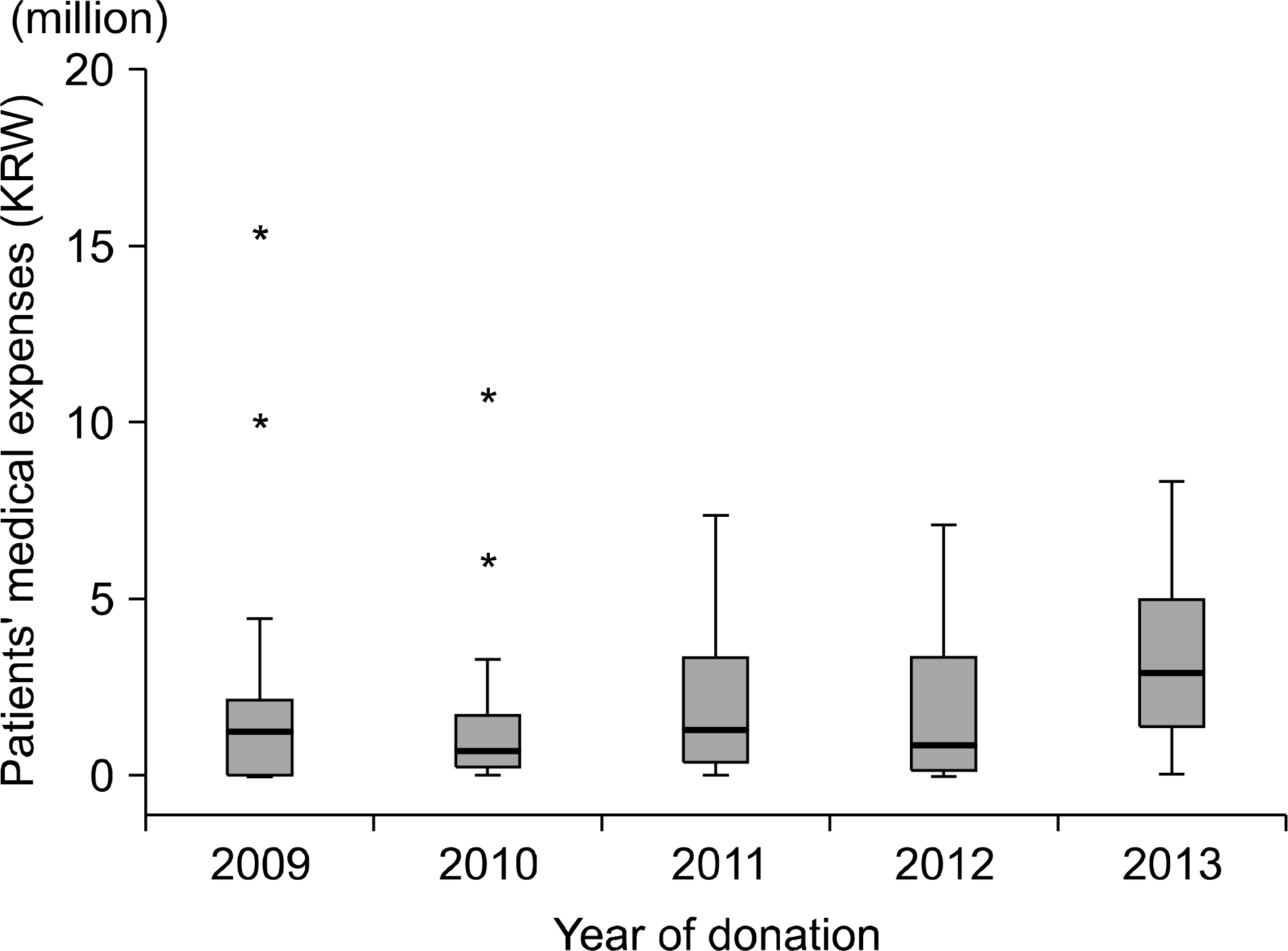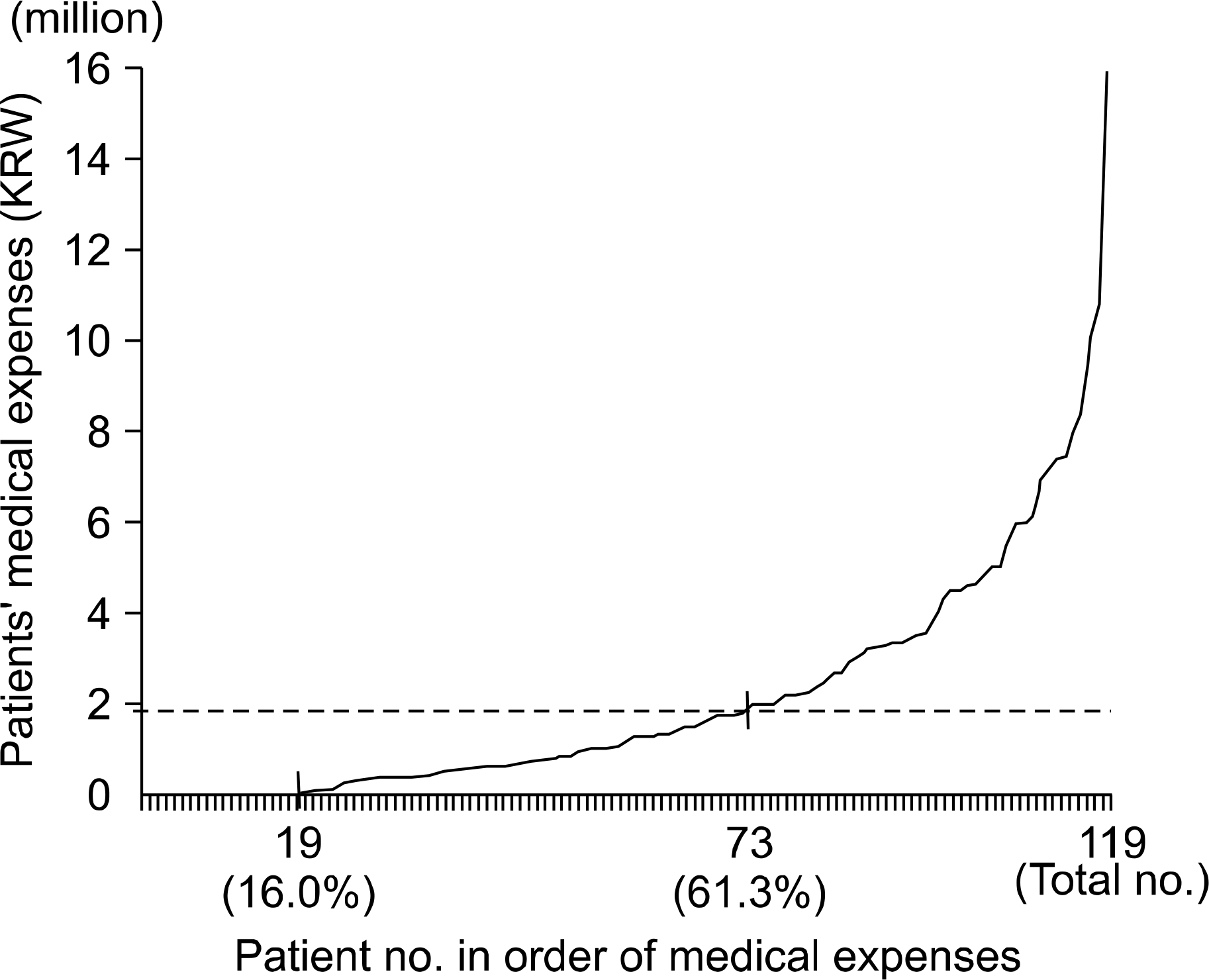Abstract
Background
Analyzing the medical expenses of the family members of brain dead organ donors would be helpful in ascertaining better ways of applying national assistance, which is important for promotion of brain dead organ donation.
Methods
We collected data regarding the medical expenses of 119 brain dead organ donors from January 2009 to December 2013 at a single institution that specializes in organ donation. Donation year, cause of brain death, age, and admission days were deemed factors affecting medical expenses, and these were analyzed. Medical expenses were compared with national assistance (maximum of 1.8 million Korean won [KRW]).
Results
Average age of donors was 42.7 years, and, in the older age group, there was a lower average for medical expenses (P=0.025). Brain dead organ donations that were consented to within 2 days after the brain death comprised 41.2%, and medical expenses increased as the consent days were delayed (P<0.001). Average medical expense for donor families was 2,161,297 KRW, and the average national assistance to the families was 577,056 KRW. The medical expenses of 73 donors (61.3%) were below the national assistance maximum; 19 (16.0%) had no charges of their own with other insurance coverage.
Conclusions
National assistance for medical expenses to family members of brain dead organ donors is necessary in Korea, where the rate of brain dead organ donation is very low. As 61% of donors were covered below the maximum assistance amount, there could be additional ways to utilize the remaining budget.
Go to : 
References
1). Yang BG. Organ transplant status (2013.11). Seed Hope Policy Mag. 2013; 6:47. (양병국. 장기등 이식현황 (2013.11 기준). 희망의 씨앗 정책매거진 2013;6: 47.).
2). Kim MG, Jeong JC, Cho EJ, Huh KH, Yang J, Byeon NI, et al. Operational and regulatory system requirements for pursuing self-sufficiency in deceased donor organ transplantation program in Korea. J Korean Soc Transplant. 2010; 24:147–58. (김명규, 정종철, 조은진, 허규하, 양재석, 변년임, 등. 뇌사 장기이식 활성화를 위한 우리나라 장기이식 운영 및 관리체제. 대한이식학회지 2010;24: 147–58.).

3). Lee JA, Kim SY. The knowledge and attitude of medical students towards the organ donation. J Korean Soc Transplant. 2008; 22:120–9. (이진아, 김소윤. 뇌사자 장기기증에 대한 의과대학생의 지식과 태도 연구. 대한이식학회지 2008;22: 120–9.).
4). You HS. The effect of brain death organ donation education on nurses' knowledge and attitude. J Korean Clin Nurs Res. 2009; 15:57–65. (유혜숙. 뇌사 장기기증 교육이 간호사의 뇌사 장기기증에 대한 지식과 태도에 미치는 효과. 임상간호연구 2009;15: 57–65.).
5). Kang HY. A study on nursing college students' knowledge and attitudes toward brain death, organ donation and organ transplantation. J Korean Acad Soc Nurs Educ. 1999; 5:7–19. (강희영. 뇌사와 장기기증 및 장기이식에 대한 간호학생의 지식과 태도 연구. 한국간호교육학회지 1999;5: 7–19.).
6). Park YJ, Kang H, Kim EM, Shin WY, Yi NJ, Suh KS, et al. Establishment of active identification and management system for potential brain dead donors in life-link center. J Korean Soc Transplant. 2009; 23:43–51. (박양디, 강현진, 김은만, 신우영, 이남준, 서경석, 등. 생명 연결본부: 능동적인 잠재뇌사자 발굴신고 및 뇌사장기기증자 관리체계 구축. 대한이식학회지 2009;23: 43–51.).
7). Cho WH, Kim SI, Kim MS, Ahn C, Bang KT, Jeon KO, et al. A proposal to activate organ donation: report of organ allocation study group. J Korean Soc Transplant. 2009; 23:8–14. (조원현, 김순일, 김명수, 안규리, 방기태, 전경옥, 등. 국내 장기기증 활성화를 위한 방안: Organ Allocation 연구회 보고서. 대한이식학회지 2009;23: 8–14.).
8). Oh MS. A survey on the perceptions and attitudes of public and medical professionals on organ transplantation. Seoul, KR: Research & research;2009. (오민수. 장기기증에 대한 일반국민 및 의료인 인식조사 보고서. 서울: Research & research; 2009.).
Go to : 
Table 1.
Average patient medical expense compared among groups according to age, cause of brain death, and admission days




 PDF
PDF ePub
ePub Citation
Citation Print
Print




 XML Download
XML Download